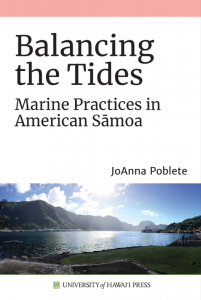Balancing the Tides: Marine Practices in American Sāmoa
Reviewed by Thomas Moorman and Dr. Kelly Dunning, Auburn University of Forestry and Wildlife, Auburn University
The spread of colonial legacy through the lives of American Samoans, and all indegenous people interacting with the western form of governance.
Balancing the Tides: Marine Practices in American Sāmoa, by JoAnna Poblete, University of Hawai‘i Press, 2020, 214 pp
Poblete shows with great skill that there is much to be learned from the historical and ongoing relationships between the United States government and colonized American Samoa. Utilizing the framework of bioregionalism, she clearly demonstrates the relationship between the region’s ecology, contemporary political dynamics, culture, and colonial legacy, making a compelling case for a native rights-based, bioregional approach to contemporary management decisions involving American Samoa’s marine resources. Poblete’s extensive interviews demonstrate that Western management models can easily fall into conflict if vā fealoa’I, or the tradition of American Samoan “social respect”, which includes proper communication along deeply rooted cultural lines and values, is not followed or satisfied.
The first half of the book shows the colonially-rooted tension between the island’s native fishing rights, and socioeconomic reality relative to U.S. fisheries data-based management models, and wage policy. Shown through the tuna industry minimum wage discussions, and commercial vs. traditional fishing access disagreements, Poblete makes clear that U.S. management of industries and waters can easily conflict with native realities if vā fealoa’I is not followed. The second half highlights how U.S. grant reporting, fisheries management decisions, and goals of environmental preservation, require and use specific data at scale, but that the reality of traditional American Samoan fishing practices and culture and the difficulty of local data collection generate tension between traditional American Samoan ways of being, and U.S. Western knowledge-based decision-making. Poblete finds that when traditional customs are followed and respected, co-management approaches and initiatives such as Village Protected Marine Areas found greater success.
Poblete’s work explains/clarifies how colonial legacy spreads through the lives of American Samoans, and by extension all indigenous people interacting with Western forms of governance. Her exploration of this tension, be it discussion of federal minimum wage or the expansion of new protected zones carries globally important insights and lessons for anyone working in governance, especially where indigenous or native rights are concerned. She demonstrates that flexible, adaptive management which incorporates and respects traditional ecological knowledge and social cultures often leads to greater conservation and management success. Her work provides an excellent starting point for both colonial activists and governance managers to improve not only relations, but also global and socio ecological wellbeing.

